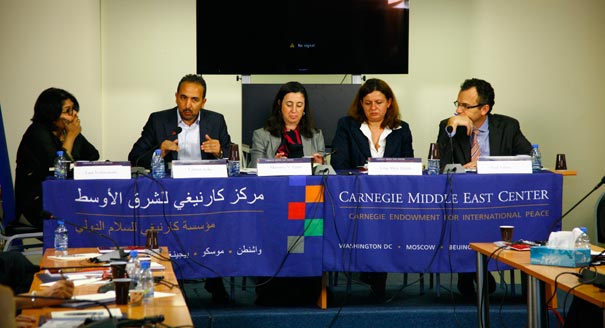Registration
You will receive an email confirming your registration.
Since the early 1990s, countries in the Middle East and North Africa (MENA) have made admirable progress in reducing the gap between men and women in areas such as access to education and health care. Nonetheless, this progress has yet to be translated into a more equal role for women in the region’s political and economic life. For instance, the worldwide average for female participation in the workforce is approximately 50 percent, yet in the Middle East and North Africa the rate is only 25 percent.
To address this central issue, the Carnegie Middle East Center and the World Bank hosted a talk on the World Bank’s 2013 gender report Opening Doors: Gender Equality and Development in the Middle East and North Africa. Experts from the World Bank, the International Labour Organization, and Carnegie discussed the report’s findings and made recommendations on enhancing women’s role in the region. Carnegie’s Paul Salem moderated.
Women’s Role in the Region
- Promising Trends: Tara Vishwanath of the World Bank began the discussion by highlighting two promising regional trends between 1985 and 2010.
- Social Progress: Vishwanath noted that the MENA region has had the fastest growth in female life expectancy in the world, and great improvements have also been made in closing gender gaps in education.
- Benefits of Political Quotas: While quotas ensuring female participation in the political realm are complex, they have had sustained effects in altering attitudes and stereotypes in the region, Vishwanath added.
- Social Progress: Vishwanath noted that the MENA region has had the fastest growth in female life expectancy in the world, and great improvements have also been made in closing gender gaps in education.
- Role of Islam: Vishwanath pointed out that, statistically speaking, Muslim-majority countries have a female labor force participation rate 14 percent lower than the OECD average.
- Oil Reserves: Unlike religion, large per capita oil reserves have no impact on female labor force participation, Vishwanath added.
- Regional Constraints: Vishwanath suggested that living in the MENA region powerfully dampens female participation rate in the labor force. She highlighted three region-specific constraints:
- Conservative Gender Norms: The ability of women to make choices and decisions regarding their employment are governed by certain norms. Vishwanath pointed out that in some cases it is perceived as shameful for women to work for pay.
- Constraining Laws: Some countries have laws that restrict women’s choice and mobility, such as laws that restrict where and how long women can work, Vishwanath added.
- Low Private Sector Participation: Among the few women who are employed, many of them work in the public sector. Vishwanath argued that this is due to the limited opportunities for women in the private sector, since private sector employers tend to perceive women as less productive.
- Conservative Gender Norms: The ability of women to make choices and decisions regarding their employment are governed by certain norms. Vishwanath pointed out that in some cases it is perceived as shameful for women to work for pay.
Toward Gender Equality
Participants highlighted the steps necessary for achieving gender equality in the MENA region:
- Women’s agency must be enhanced through legal reform, said the World Bank’s Caroline Anstey.
- Gender gaps in health, education, and basic services must be closed, added Anstey.
- Constraints to female participation in the labor market, especially the private sector, must be removed, Anstey argued.
- Female owned and operated business must be expanded through greater access to finance and training, said Anstey.
- Government and international organizations must introduce accountability for gender equality, said Lina Abou Habib of the Collective for Research and Training on Development.
- The media must be used to tackle the negative stereotyping of women, argued Merza Hasan of the World Bank.
- More research must be conducted on the quality of work available to women, and a more thorough analysis to the Arab family structures is needed, said Carnegie’s Lahcen Achy.
- Policies and regulations, including quotas for female participation in the political and economic spheres, should be encouraged, said Abou Habib.
- The progress made so far on women’s rights must be preserved and expanded upon, Abou Habib concluded.
Participants included Manuela Ferro, the director of Poverty Reduction and Economic Management for the World Bank’s MENA division; Tara Vishwanath, a lead economist of the Poverty Reduction and Economic Management for the World Bank’s MENA division; Merza Hasan, the dean of the World Bank’s Board of Executive Directors; Caroline Anstey, the World Bank’s Managing Director at the Office of the President; Lina Abou Habib, the executive director of the Collective for Research and Training on Development; and Lahcen Achy, a senior associate at the Carnegie Middle East Center. Carnegie’s Paul Salem moderated.
